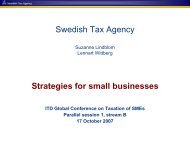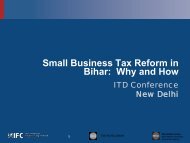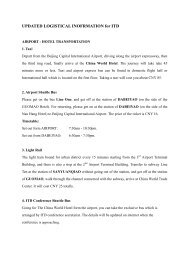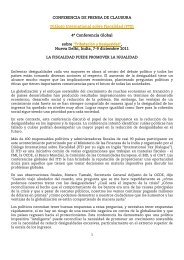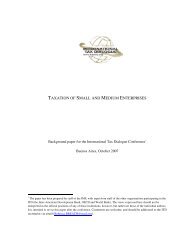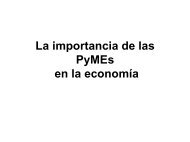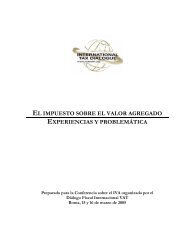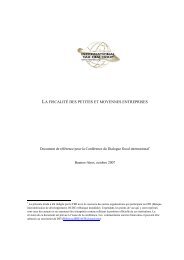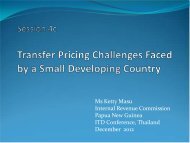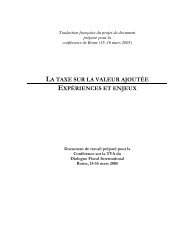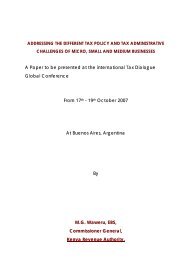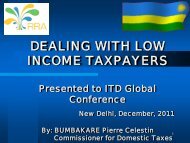Arcotia Hatsidimitris - International Tax Dialogue
Arcotia Hatsidimitris - International Tax Dialogue
Arcotia Hatsidimitris - International Tax Dialogue
Create successful ePaper yourself
Turn your PDF publications into a flip-book with our unique Google optimized e-Paper software.
52 – 6. REACHING A DECISION POINT<br />
Where transfer pricing issues meet the above criteria they are considered by the HRCP Board on<br />
the basis of recommendations made by the Transfer Pricing Board. Where transfer pricing issues do<br />
not meet the criteria mentioned above, decisions are referred to the Transfer Pricing Board either by<br />
the case team or by the Transfer Pricing Panel for the LBS or the Panel covering all the other areas of<br />
HMRC undertaking this work. The Board makes the final decision on cases where litigation is<br />
proposed by a Panel and agrees settlement parameters in high value cases below the threshold for<br />
submission to the HRCP Board.<br />
In many tax administrations processes for deciding whether or not to litigate require decision<br />
taking to be made by individuals who have not been directly involved in working or managing the<br />
audit or enquiry. A written submission is normally required setting out:<br />
• the position of the parties,<br />
• a recommendation from the most senior manager with oversight of the audit or enquiry,<br />
• an assessment of whether penalties could be sought if the case is won.<br />
The key issues in deciding whether or not to litigate are likely to be some or all of the following:<br />
• From the tax administration perspective, do a transfer pricing specialist and a litigation<br />
lawyer agree that the case is a strong one that can be won?<br />
• Is a significant amount of tax at stake?<br />
• Have all attempts to negotiate a reasonable settlement failed?<br />
• Is the case likely to be the subject of consultation under the Mutual Agreement Procedure<br />
provided for in a double taxation agreement?<br />
• Is there evidence of good quality to support the tax administration’s arguments and has that<br />
evidence been proved (can someone speak authoritatively to the source of the evidence) and<br />
properly examined by lawyers and specialists?<br />
• Are expert witnesses needed and, if so, what are they going to speak to? Has their evidence<br />
been fully tested?<br />
<br />
<br />
Could the time and money costs of litigation outweigh the benefits of success?<br />
Do legal precedents support the tax administration’s position?<br />
In the UK the answer “No” to any one of the above questions may lead to a decision that<br />
litigation is inappropriate and that further negotiation or a form of alternative dispute resolution would<br />
be more appropriate. In the UK, HMRC does not litigate speculatively and if on balance the case is<br />
likely to be lost in litigation, it will not be pursued.<br />
In HMRC the governance process for decision making in Transfer Pricing cases requires a<br />
referral, in the first instance to the Transfer Pricing Panel before a decision is taken as to how the case<br />
should be concluded.<br />
DEALING EFFECTIVELY WITH THE CHALLENGES OF TRANSFER PRICING © OECD 2012



